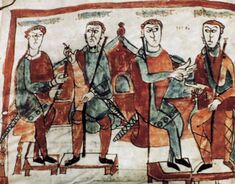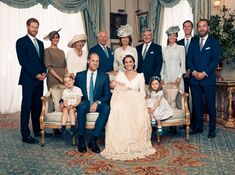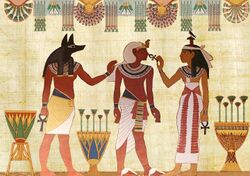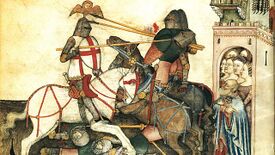Dynasty
A dynasty is a legal term to define a ruling family that manage to keep hold of power through generations. Historical examples of this include the Habsburgs and Romanovs. Today's examples are the Japanese imperial Yamoto family, North Korea's Kim Dynasty and the Windsors of Great Britain.
Dye Nasty?[edit]
The Greeks invented everything, so you won't be surprised the came up the word 'Dynasty' too. They thought a 'dynasty' (short for 'dynamic nasties') was the way the world went round, since they were also Globalists as compared to the Flat Earthers of Kentucky. These dynasties differed from other types of holding power like an elective monarchy, emotive oligarchy or a democratic cesspit.
They also tended to be male led. Power passed through one male penis to the next one until impotence or madness struck. Only then were females involved in a dynastic succession, a somewhat ironic that in a world without test tube princes, ruling families relied on females to pass on the power.
How do you create a dynasty?[edit]
When you think about it, why should any human bow or scrape to another unless it is through sheer fear or a belief system that somehow a ruler has a direct line to the Almighty? All dynasties have claimed some divine inheritance, be they in Asia, Europe, Africa or the Americas. Earlier ones claim to be the sons (rarely daughters) of a particular god or if a little bit more indirect, the son of a being who had both divine and human attributes. Think of say Gilgamesh from Babylon and Heracles from the Greek World. The Romans claimed as their divine father the Roman God of War Mars, an apt daddy considering their fearsome military reputation. However others claimed Venus as a truer ancestor of Romans as that linked them back to the Trojan War and that they had originally lost against the Greeks. With the coming of Christianity this changed a bit as the idea of being the literal son of Jesus Christ was considered heretical, unlike in Islam where a family connection to the Prophet Mohammed was generally very helpful to your claims. Since Christianity and Islam talked about a Kingdom of God, replicating that on Earth was no big deal and generally encouraged.
Ancient Egyptian Dynasties[edit]
We have to go back about 5,000 years for the first dynasties in Egypt. An Egyptian priest called Manetho once counted them all. He said there had been 30 dynasties during that time. They didn't see themselves as separate families as such, believing all were descended from the god Ra, Aten, Thoth or whoever was in ascendance in the Egyptian pantheon.
Ancient Greece[edit]
The Ancient Greeks lived in city states. They said their superior philosophy had no use of one man rule but the habit was maintained in Macedonia and Sparta. The Greeks invented something else. They called it Democracy. This meant a constitution and a supposed society of equals as in Athens. It was popular for a time. Those who believed in monarchy didn't like this. There had been no democracy with the Greek gods on Olympus, why here on Earth? Eventually one man put an end to all this nonsense. Alexander the Great conquered the world instead. Greek culture soon dropped all reference to democracy.
Alexander expected to found a great dynastic empire as had happened with Cyrus the Great and the Persians. However, Alexander's family was wiped out by his generals who founded their own family run empires including The Antagonids, The Seleucids and The Ptolemies. They lasted until the Roman Empire.
Ancient Romans[edit]
The Romans had overthrown their own monarchy in the 6th century BC. The created an aristocratic Republic, divided between a patrician class and a mob of plebians. The aristocrats retained control of the republic until the era of generals. The Romans then re-invented a sort of monarchy with the family of Julius Caesar and Augustus. Like Alexander the Great they thought they were going to create a mighty dynasty. It last barely 100 years, brought down by assassinations, death and murder that spared no one regardless of age or sex. Despite this, later rulers talk the former family names of Old Julie and his nephew as their own, titling themselves as 'Caesar Augustus' until the end of their empire.
Dark Age dynasties[edit]

The barbarian invaders of the Roman Empire usually claimed ancestry back to 'Odin' or 'Woden'. The Merovingians of France claimed they were the sons of Merovech, a king of his people as the result of a rape of a princess and a sea monster. Later on the writer Dan Brown said the Merovingians were actually descended from Jesus Christ and Mary Magdelene, a sign of the special status being that they were forbidden to have their cut. These shaggy monarchs were eventually displaced (after a 300 year run!) by the house of Frankish warrior Charles Martel. They were originally called the 'Martelians' but when changed their surname to Carolingians with the rule of Holy Roman Emperor Charlemagne. From the later all European royal families would later claim an affinity with or descent from, via intermarriages between cousins.
Medieval dynasties[edit]
The prize of keeping power to a particular family has to belong to the French Capetian dynasty. From 987 to 1793 a Capet was King of France. Because the Capetians didn't like women, when one branch of the family died out, the monarchy was passed on to another collateral branch like the House of Valois and the House of Bourbon. The Capets were able to spread to other European countries, supplying monarchs from the same family.
Their rivals for longevity were the Russian House of Rurik. Originally from Sweden, old man Rurik is considered to be the first 'Russian' ruler from the mid 9th century until the end of the 16th century. Rurik himself seems to have been nothing more than a rogue with an uncut beard but it didn't stop him and his descendants keeping power until they ran out of eligible males. Perhaps not helped by having Ivan the Terrible in your family.
It should also be mentioned that in England the family of William the Conqueror was short-lived, disappearing in the legitimate male line in 1135 with the death of King Henry I. They were replaced by another French dynasty, the House of Angevin or as they were better known, the Plantagenets. This particular dynasty ruled England for over 300 hundred years but managed to kill each other in the War of the Roses, allowing an obscure bunch of Welsh knights known as the Tudors to take control.
Renaissance dynasties[edit]
The Renaissance started in Italy so it is fair to look af their dynasties. Usually a line of monarchs came from a military war band leader but one family started out as bankers and then essentially bought themselves power. These were the Medici. They did all good things like sponsoring artists and making Italy a top tourist destination. Though never kings, they stayed rich until dying out in the 18th century. Once again a lack of male heirs ended that family.
In Germany where many families had competed for the imperial throne, one in particular came out on top. These were the Habsburgs. Their family motto was 'make babies, not war'. This allowed them to consolidate a block of territory that became Austria and went on to slip on to the throne of Spain just as that country was exploiting the New World and becoming very rich in the process. Their success made other European monarchies (especially the Tudors and the Valois) very jealous.
Later dynasties[edit]
It does seem curious to us that people in countries were never consulted about who their next monarch was. Some countries did have 'elective monarchies' where the a parliament was supposed to vote. This is how the Polish-Lithuania state organised its affairs from the mid 16th century when their ruling dynasty died out. Since there was no hereditary right to power, would be kings had to essentially buy their voters, restricted to the artistocrats. The throne was open to the highest bidder. It didn't often lead to anyone good and probably helped the demise of the country in the late 18th century when its neighbours carved it up like a prize turkey.
A mention should be made here of the Scottish Stuart dynasty. A somewhat accident prone family with Stuart kings killed in battle, murdered in their beds or blown up by dangerous cannons, the family thought it hit the jackpot when they succeeded the Virgin (possibly not) Queen Elizabeth I of England. But being Stuarts, they managed to lose everything with a king getting executed and another forced into exile because he preferred being a Catholic in a country where the national church was protestant.
Somewhat outside the European tradition, the Turkish Ottoman Empire was under the despotic rule of one family. The Ottomans had founded their state on the dying Byzantine Empire in the late 13th century. Even more so than the European dynasties, your mortal enemies were often your own siblings or cousins. The Ottomans thought they could overcome this with a simple rule. A ruling Sultan could kill all his brothers on succession. This was fine if an Ottoman ruler had a long life but quite a few didn't. So this was changed to a system where brothers and cousins were kept in a gilded cage inside their own palace to be used like spare batteries. Only required if a ruling Ottoman could provide no further juice. It was a distinctly unEuropean way of ruling but the Ottomans stayed in power until 1924.
Chinese dynasties[edit]
The Chinese dynasties are best known for the quality of their pots. They changed less frequently than the European monarchies and had relatively easy names to remember like the Shang, Han, Tang, Thong, Song and Ming. Women were again usually barred from succession but could be a involved if a Chinese emperor was a child. This was true of the last Chinese dynasty, called either the Manchu (to show you thought them foreign) or Qing (if you wanted to keep your head). Because each Chinese ruler had a distinctive name (and would change it once become emperor), they are harder to remember. Not for the Chinese of course, just dull Europeans repeating the first name (here's looking at you King Louis.
Japanese dynasties[edit]
The Japanese claim they have had the same family ruling them since before the country existed. It is in a direct line from the Japanese Sun god Sony. The Japanese emperors (the only ruling emperors in the world now) were once active monarchs but during long periods of time, they had stayed inside their palaces and let the various Samurai war lords be the active rulers of a country as Shoguns. They were quite happy to stay isolated from other influences but then the British, French and Americans wanted to trade with these mysterious people. The Shoguns couldn't adapt in time and were replaced by emperor Meiji the Great. He wanted Japan to have an active monarchy. It would lead on to a Japanese Empire (after all, Japan had an emperor) until World War Two. Japan had the chance to have become a republic like other countries whose imperial rulers had forfeited power (and home, all were exiled) after military defeat.
Other dynasties[edit]
There have been other ruling dynasties. Thailand still has a monarchy, which is legally above criticism or ridicule. In the Arab world, Jordan and Morocco still have their dynasties as does Saudi Arabia. The Kim Dynasty of North Korea claims both divine and Marxist powers to keep their dynasty in power and pass rule down the family line. The Kims haven't been shy in murdering family members who were labelled 'surplus to the dynasty'.
The United States also has shown it has a dynastic inclination with the recent domination of the Bush family and the attempted domnination by the Clintons. There is still time for the Trump family to make a comeback and undoubtedly, more dynasties will have political ambitions to match.
Perhaps the only American dynasty to succeed was the Carrington-Colbys from the 1980s TV show Dynasty. Viewing figures alone have only been matched by that other media monarchy, The Windsors.
| ||||||||||||||||





